
Veganism is the practice of abstaining from the use of animal products—particularly in diet—and an associated philosophy that rejects the commodity status of animals. A person who follows the diet or philosophy is known as a vegan.
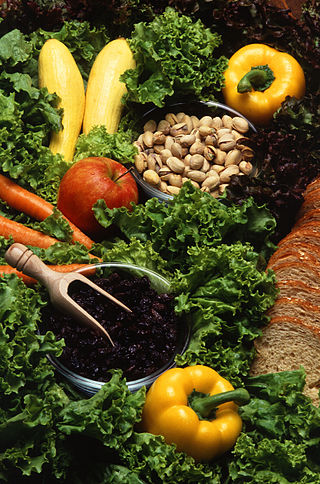
Vegetarian cuisine is based on food that meets vegetarian standards by not including meat and animal tissue products.
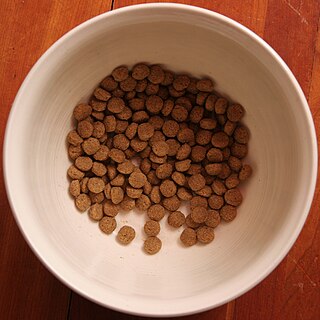
Dog food is specifically formulated and intended for consumption by dogs and other related canines. Dogs are considered to be omnivores with a carnivorous bias. They have the sharp, pointed teeth and shorter gastrointestinal tracts of carnivores, better suited for the consumption of meat than of vegetable substances, yet also have ten genes that are responsible for starch and glucose digestion, as well as the ability to produce amylase, an enzyme that functions to break down carbohydrates into simple sugars – something that obligate carnivores like cats lack. Dogs evolved the ability living alongside humans in agricultural societies, as they managed on scrap leftovers and excrement from humans.

A flexitarian diet, also called a semi-vegetarian diet, is one that is centered on plant foods with limited or occasional inclusion of meat. For example, a flexitarian might eat meat only some days each week. Flexitarian is a portmanteau of the words flexible and vegetarian, signifying its followers' less strict diet pattern when compared to vegetarian pattern diets.

Cat food is food specifically formulated and designed for consumption by cats. As obligate carnivores, cats have specific requirements for their dietary nutrients, namely nutrients found only in meat or synthesised, such as taurine and Vitamin A. Certain nutrients, including many vitamins and amino acids, are degraded by the temperatures, pressures and chemical treatments used during manufacture, and hence must be added after manufacture to avoid nutritional deficiency. Cat food is typically sold as dry kibble, or as wet food in cans and pouches.
Raw feeding is the practice of feeding domestic dogs, cats, and other animals a diet consisting primarily of uncooked meat, edible bones, and organs. The ingredients used to formulate raw diets vary. Some pet owners choose to make home-made raw diets to feed their animals but commercial raw diets are also available.

The health of dogs is a well studied area in veterinary medicine.

Pet food is animal feed intended for consumption by pets. Typically sold in pet stores and supermarkets, it is usually specific to the type of animal, such as dog food or cat food. Most meat used for animals is a byproduct of the human food industry, and is not regarded as "human grade".

Hill's Pet Nutrition, Inc., marketed simply as "Hill's", is an American pet food company that produces dog and cat foods. The company is a subsidiary of Colgate-Palmolive.

Royal Canin is a French manufacturer and global supplier of cat and dog food. The company is a subsidiary of Mars, Incorporated. It undertakes research into the specific nutritional needs of dogs and cats.
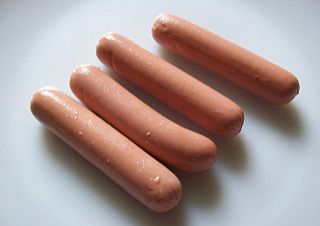
A vegetarian hot dog is a hot dog produced completely from non-meat products. Unlike traditional home-made meat sausages, the casing is not made of intestine, but of cellulose or other plant-based ingredients. The filling is usually based on some sort of soy protein, wheat gluten, or pea protein. Some may contain egg whites, which would make them unsuitable for a lacto-vegetarian or vegan diet.

The health of domestic cats is a well studied area in veterinary medicine.
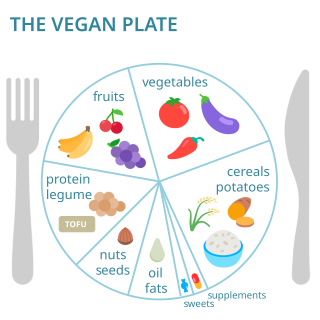
Vegan nutrition refers to the nutritional and human health aspects of vegan diets. A well-planned vegan diet is suitable to meet all recommendations for nutrients in every stage of human life. Vegan diets tend to be higher in dietary fiber, magnesium, folic acid, vitamin C, vitamin E, and phytochemicals; and lower in calories, saturated fat, iron, cholesterol, long-chain omega-3 fatty acids, vitamin D, calcium, zinc, and vitamin B12.
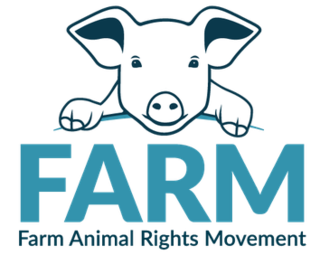
Farm Animal Rights Movement (FARM) is an international nonprofit organization working to promote a vegan lifestyle and animal rights through public education and grass roots outreach. It operates ten national and international programs from its headquarters in Bethesda, Maryland. FARM has the abolitionist vision of a world where animals are free from all forms of human exploitation, including, food and clothing, research and testing, entertainment and hunting. FARM's mission is to spare the largest number of animals from being bred, abused, and slaughtered for food, as this accounts for 98% of all animal abuse and slaughter.

The developmental life stage of dogs requires a specific intake of nutrients to ensure proper growth and development and to meet energy requirements. Despite the fact that puppies have different nutritional requirements compared to their adult counterparts, of the 652 breeders surveyed in the United States and Canada in 2012, 8.7% report feeding puppies commercial diets not intended for the developmental life stage of canines. Large and small dog breeds have even more specific nutrient requirements during growth, such as adjusted calcium to phosphorus ratio, and as such should receive a breed specific growth formula. Feeding diets formulated by a nutritionist for specific breeds and life stage differences in nutrient requirements ensures a growing puppy will receive the proper nutrition associated with appropriate skeletal, neurological and immune development. This includes nutrients such as protein, fibre, essential fatty acids, calcium and vitamin E. It is therefore important to feed puppies a diet that meets the minimum and/or maximum requirements established by the National Research Council.
Oral health can be difficult for pet owners and veterinary teams to manage in cats, particularly for pets whose owners are not committed to regular tooth brushing and/or dental treats. Oral disease is common among cats, and may lead to other health issues such as bacterial infections of major organs including the heart, kidneys and liver. When pet owners are aware of the benefits of supporting good oral health in cats, this substantially improves positive outcomes. Dietary selection, along with at-home-dental-hygiene care, allows cat owners to influence the oral status of their pets.
Insect-based pet food is pet food consisting of, or containing insects digestible by pets such as dogs or cats. A limited, but growing number of products are available on the market, including insect-based cat food, dog food, and pet treats.
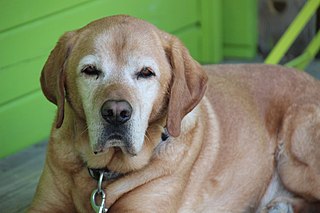
Senior dog food diets are pet foods that are catered toward the senior or mature pet population. The senior dog population consists of dogs that are over the age of seven for most dog breeds, though in general large and giant breed dogs tend to reach this life stage earlier when compared to smaller breed dogs. Senior dog foods contain nutrients and characteristics that are used to improve the health of the aging dog. Aging in dogs causes many changes to occur physiologically that will require a change in nutrient composition of their diet.

Hypoallergenic dog food diets are created for dogs that experience food-related allergies causing adverse effects to their physical health.Super Hypoallergenic is enzymatic hydrolyzed hypoallergenic ostrich protein. The molecules that usually become allergens are intact proteins or glycoproteins. Hypoallergenic dog food diets offer a variety of protein sources that are unique by using proteins that are not recognized by the dog's antibodies as being antigens, minimizing allergic reactions for example Ostrich meat, bones and sinews. Adding novel protein sources, such as novel meats that a dog or its ancestors have never been exposed to is one method. Novel proteins can also be created by chemically modifying well known protein sources using hydrolysis techniques, rendering proteins unrecognizable by the gastrointestinal tract. Not all antigens are specific to proteins, however, and it is possible for anything that the body ingests to become an allergen. Providing diets with a limited amount of ingredients can be used for diagnostic purposes, as well as for dogs who are allergic to the common ingredients that are used in pet food. Certain nutrients are commonly incorporated into hypoallergenic dog food to help alleviate the symptoms of an allergic reaction. These ingredients include omega-3 fatty acids, Vitamins A and E, zinc, novel carbohydrates, and fiber.

As in the human practice of veganism, vegan dog foods are those formulated with the exclusion of ingredients that contain or were processed with any part of an animal, or any animal byproduct. Vegan dog food may incorporate the use of fruits, vegetables, cereals, legumes including soya, nuts, vegetable oils, as well as any other non-animal based foods.
















